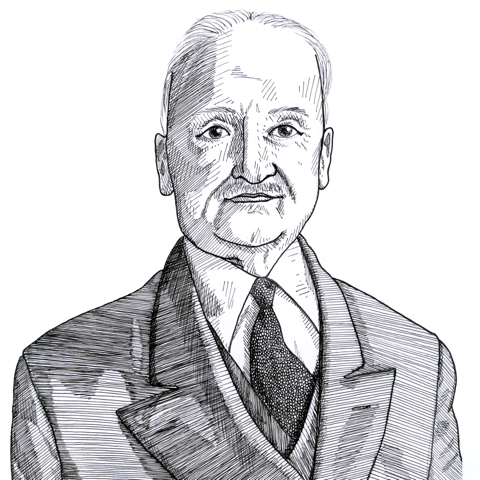
Mises on how price controls lead to socialism (1944)
Found in: Omnipotent Government: The Rise of the Total State and Total War
The Austrian-American free market economist Ludwig von Mises (1881-1973) left Switzerland for the United States in August 1940. During the war years he wrote a number of books which criticised government intervention and control of the economy, especially price controls and rationing. He had witnessed first hand how the Nazis used price controls in Europe and saw something very similar happening in the United States during World War 2. He thought the logical consequence of strict price controls would be a system of socialism:
Socialism & Interventionism
The prices set on the unhampered market correspond to an equilibrium of demand and supply. Everybody who is ready to pay the market price can buy as much as he wants to buy. Everybody who is ready to sell at the market price can sell as much as he wants to sell. If the government, without a corresponding increase in the quantity of goods available for sale, decrees that buying and selling must be done at a lower price, and thus makes it illegal either to ask or to pay the potential market price, then this equilibrium can no longer prevail. With unchanged supply there are now more potential buyers on the market, namely, those who could not afford the higher market price but are prepared to buy at the lower official rate. There are now potential buyers who cannot buy, although they are ready to pay the price fixed by the government or even a higher price. The price is no longer the means of segregating those potential buyers who may buy from those who may not. A different principle of selection has come into operation. Those who come first can buy; others are too late in the field. The visible outcome of this state of things is the sight of housewives and children standing in long lines before the groceries, a spectacle familiar to everybody who has visited Europe in this age of price control. If the government does not want only those to buy who come first (or who are personal friends of the salesman), while others go home empty-handed, it must regulate the distribution of the stocks available. It has to introduce some kind of rationing. …
The isolated measures of price fixing fail to attain the ends sought. In fact, they produce effects contrary to those aimed at by the government. If the government, in order to eliminate these inexorable and unwelcome consequences, pursues its course further and further, it finally transforms the system of capitalism and free enterprise into socialism.
Many American and British supporters of price control are fascinated by the alleged success of Nazi price control. They believe that the German experience has proved the practicability of price control within the framework of a system of market economy. You have only to be as energetic, impetuous, and brutal as the Nazis are, they think, and you will succeed. These men who want to fight Nazism by adopting its methods do not see that what the Nazis have achieved has been the building up of a system of socialism, not a reform of conditions within a system of market economy.
There is no third system between a market economy and socialism. Mankind has to choose between those two systems—unless chaos is considered an alternative.****